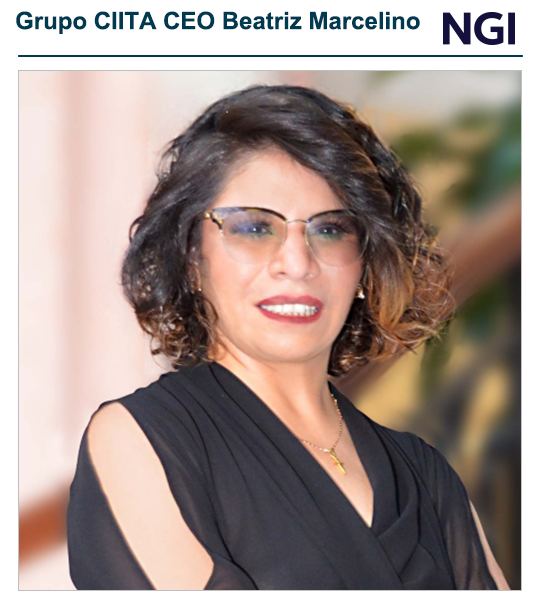“My first hope for the next presidential administration in Mexico, whoever wins, is that they are receptive and listen to the voices of the sector,” Beatriz Marcelino, CEO of Grupo CIITA, told NGI’s Mexico GPI. “During the first years of this administration, the doors were closed for us and members of the sector and we weren’t allowed to participate. This is no longer the case, and we hope that continues into the next administration.”

Mexicans headed to the polls on June 2 are poised to elect their first female president, either Claudia Sheinbaum of the Morena Party or Xóchitil Gálvez of the opposition coalition.
Marcelino is the CEO of Grupo CIITA, an energy industry consulting firm that she founded in 2006. Marcelino and Grupo CIITA have worked extensively with Petróleos Mexicanos (Pemex), as well as private energy sector companies, providing environmental auditing services, land remediation studies, regulatory advisory and risk analysis for more than 20 years.
Grupo CIITA, which has grown to 46 employees, has clients in the oil, natural gas, liquefied petroleum gas and gasoline and fuel sectors, and was actively involved in the implementation of Mexico’s 2013 energy reform. The company also specializes in Mexican energy industry regulation, permits and authorizations required for private and public companies and also offers advisory services and training.
Marcelino also is president of Mexico’s Association of Energy Distributors & Vendors (ADEE) and a member of Voz Experta, an initiative to promote women’s voices in the energy industry. She is a graduate of the Escuela Nacional de Ciencias Biológicas of the Instituto Politécnico Nacional in Mexico.
Editor’s Note: NGI’s Mexico Gas Price Index, a leading tracker of Mexico’s natural gas market reform, offers the following Q&A column as part of a series of periodic interviews with market experts of natural gas in Mexico. Marcelino is the 126th expert to participate in the series.
NGI: We’re weeks away from the presidential elections in Mexico. What’s your outlook for the Mexican energy industry during the next administration, regardless of who wins on June 2?
Marcelino: The two principal candidates – Claudia Sheinbaum and Xôchitl Gálvez – have studied the energy industry extensively and have experience and knowledge of the sector, such as in renewable energies and the energy transition, which we are still far from achieving in Mexico. In my opinion, we are 20 years behind in the energy transition, and there are multiple countries in Latin America that are far more advanced than we are in renewable technologies. Some South American countries are already generating power through hydrogen, for example, or have far more advanced renewable energy generation.
So, the fact that the two candidates, by formation, have knowledge and experience in the energy industry – one as an academic and one as a businesswoman – is a good sign for the sector. They have initiatives and proposals in mind and, from my point of view, the first thing that I would hope for is that they listen to members of the industry. During the first years of this administration, the doors were closed for us and members of the sector and we weren’t allowed to participate. This is no longer the case, honestly, and in the past two years the doors have again been open to the private sector and it’s remained that way so far.
For that reason, my first hope for the new administration, whoever wins, is that they are receptive and listen to the voices of the sector. For many of us in the industry, including many major companies and business owners, we suffered during the first years of this administration.
My second hope is for an improved regulatory environment.
NGI: What specifically are your hopes for the energy industry’s regulatory environment during the incoming administration?
Marcelino: During those first years of this administration, we obviously saw a dramatic reduction in permits awarded from the Comisión Reguladora de Energía (CRE). At Grupo CIITA, we’ve always said that the basis for launching a project in the energy industry starts with authorizations and permits. Without them, you can’t do anything or are forced to operate in complete illegality. You have to comply with all the steps and processes – legal and operational – when starting a new project in Mexico, and the first step is permitting. So, I’m hopeful that the administration is receptive to hear the voices of the industry members, particularly those of us who are so familiar with the regulatory environment, so that we can be of assistance to improve existing norms and regulations.
I think that, since 2016 and 2017, the industry is over-regulated. While the energy reform of 2013 was a great opportunity for Mexico, it was also done in “fast-track” form and there are numerous issues with the current regulation that could be improved. For example, there are separate regulations at a local municipal, state and federal level, meaning projects have to be approved at three different levels of government. Often, they don’t agree and it adds additional costs and overcharges and delays. So, again, I hope the next administration is open to hear the opinions of the experts, particularly those with deep knowledge of the existing regulations, to improve the current regulatory landscape.
NGI: There seems to be a lot of questions about what the relationship will be between the government and the private sector during the incoming administration. How would you want that relationship to look during the next six years?
Marcelino: I think that committees should be formed that combine members of the private sector and the government, as well as their advisors. I’ve been in meetings recently between business leaders and the government – and this is during the period in which the government has opened the doors to private companies – and there is a very clear lack of communication between the two sides. The private executives are trying to develop a project, and it is the role of the government advisors to explain what’s being offered, though often fail to communicate it well. That’s something we’ve been seeing recently, and I think a possible solution to that lack of understanding would be to hold meetings and work groups that include all members of the sector, including from the academic arena as well, to participate. I think if there were work groups that combined the private sector, government and industry academics, it would allow for more projects to be developed at an efficient pace to meet market demands.
NGI: You mentioned that the government has opened its doors more to private investment in the last few years. What has that change in policy looked like?
Marcelino: In 2020 and 2021, for example, there was literally no one from the government or public sector that you could approach or that was accessible to receive the questions from the private sector. There weren’t meetings with the public sector to resolve our questions or to make suggestions or assist with the permitting process. The doors to the industry were closed and, while obviously Covid-19 was part of that explanation, there was not a willingness from the government sector to meet with members of the private sector.
Near the end of 2022, as the President of Mexico’s Association of Energy Distributors & Vendors, we began to request meetings with the government as an association. In ADEE, our members are principally from the natural gas, liquefied petroleum gas and petroleum products markets, and the government did begin to open the doors to us and other industry associations. By doing so, they began to take and listen to our questions, recommendations and comments, and some changes were made.
One agency in particular that we have had a good working relationship with is the Agencia de Seguridad, Energía y Ambiente (ASEA). Since 2021, following Covid, ASEA has been receptive to the comments and feedback from the industry and have made regulatory adjustments to better facilitate operations from sector members. In this administration, ASEA, in my opinion, has been one of the agencies that has implemented regulations that effectively improve and contribute to an improved regulatory environment in the industry. They seem to recognize that security in the energy industry, as well as environmental protection, is a priority. And they aren’t looking to interfere or impede a project for lacking a single document, for example, or something that is perhaps subjective. They’d prefer for operations to be physically sound and secure instead of finding ways to slow regulatory processes and interfere with operations.
Additionally, last year, the CRE again opened its doors and there were forums and meetings and some trainings, though I think that there still is a lot of work to be done in the regulatory environment for the sector, and closing the doors to the private sector for a few years definitely impacted where we stand today.
NGI: What do you expect for the Mexican natural gas industry in the upcoming years?
Marcelino: The government has been criticized some for the energy transition and its inclusion of natural gas as a key component of that process, particularly with the combined-cycle power plants, for example. The truth is that natural gas is, without question, the fuel of the energy transition. That’s the reality. Apart from the fact that it is a fuel derived from fossil fuels, it is of course less contaminating and the most economic source.
It is also well known that in Mexico, we have giant natural gas reserves that haven’t been developed. To me, it is frustrating to know that we have major basins where we know there is natural gas to be extracted and that we’ve done almost nothing to take advantage of them. We’ve been aware of these fields for decades and are yet to prioritize their development, and in the meantime rely more and more on natural gas imports from the U.S. So, in my opinion, there is a need for a change of mindset in Mexico in which we prioritize development of our own natural gas basins. Part of the Mexico energy transition could include more vehicular natural gas, which is being used in large scale in regional countries such as Colombia, though we haven’t integrated it much so far.
Finally, and as a priority for the sector, we have to improve electricity transmission. The state companies haven’t invested enough in electricity transmission networks, and as the recent days have demonstrated, that is an urgent priority for the country.







